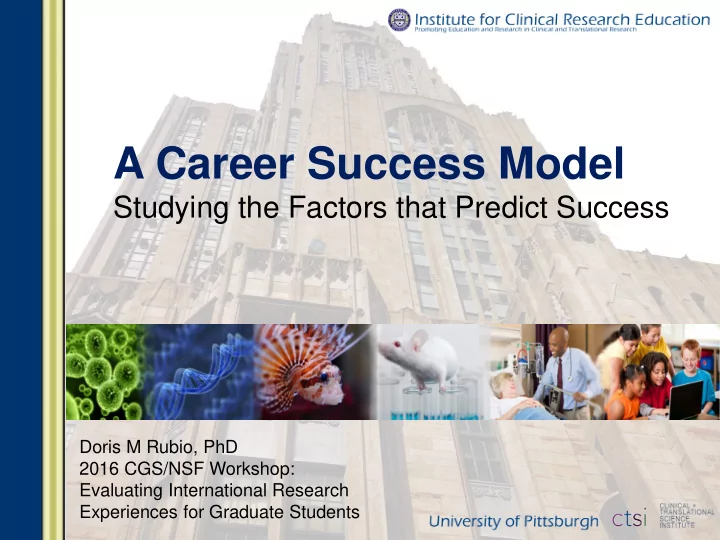

A Career Success Model Studying the Factors that Predict Success Doris M. Rubio, PhD Doris M Rubio, PhD 2016 CGS/NSF Workshop: Evaluating International Research Experiences for Graduate Students
Mission : Increase pool of clinician (especially physician) investigators locally and nationally Goals : Expand the spectrum opportunities: from exposure (courses) to certificate, MS, PhD Extend the pipeline of training: for all levels, from high school students to faculty Enhance mentoring, provide research resources and remove barriers to clinical and translational research careers
Established in 2005 to bring together all of the clinical research training programs 2006 CTSI funding Research Education and Career Development Core of the CTSI Roadmap K12 became KL2 under CTSI CTSI T32 (TL1) MS, PhD in Clinical Research AHRQ T32 in Health Services Research AHRQ T32 in CER AHRQ K12 in CER; Collaboration with K12 Emergency Med Doris Duke Clinical Research Fellowship for medical students; Doris Duke Academy for Clinical Research Clinical Scientist Training Program (CSTP) ICRE training programs are used by T32s and K23 awardees
Office of Evaluation • Research on Careers Committee • Track and evaluate all trainees • Provide evaluation expertise to other training programs • A few example publications: 1. Rubio DM, Primack BA, Switzer GE, Bryce CL, Seltzer DL, Kapoor, WN. A comprehensive career-success model for physician scientists . Acad Med. 2011: 86(12):1571-6 2. Dilmore TC, Rubio DM, Cohen E, et al. Psychometric properties of the mentor role instrument when used in an academic medicine setting . Clin Transl Sci. 2010;3(3):104-8. 3. Primack BA, Dilmore TC, Switzer GE, et al. Burnout among early career clinical investigators . Clin Transl Sci. 2010;3(4):186-8.
ICRE Program Frequency Percent PhD (CTS) 8 5% MS (Clinical 79 50% Research) Age: Mean=35.6; SD=5.6 Cert (Clinical 72 45% Research) Total 159 100% Degree Frequency Percent Bachelor 8 5% Master 9 6% Clinical Doctor 131 82% (MD) Research 11 7% Doctor (PhD)
Gender Frequency Percent Male 71 45% Female 87 55% Race Frequency Percent Asian 41 26% Hispanic Frequency Percent African 13 8% 0 147 95% American 1 8 5% White 100 65% Other 1 1% Minority Frequency Percent No 138 87% Yes 21 13%
Job Career Life Intrinsic Success Satisfaction Satisfaction Satisfaction N 80 81 81 Mean(SD) 5.16 (1.04) 3.64 (0.96) 5.12 (1.25) Min 2.29 1 1.4 Max 7 5 7 • Total number of publications: 0 to 73 • Mean number of total publications per alumni: 4.85 • Mean number of publications per year per trainee: ranges 0 - 10 • Mean average number of publications per year per trainee: 1.09
Bivariate tests Averaging responses over all alumni surveys per trainee p < .05 Age, Gender, Minority Life Events, Burnout, Mentoring, Networking
Job Satisfaction (average of 7 items) Networking – average # of people connected (p=.003) Career Satisfaction (average of 2 items) No variables significantly related Life Satisfaction (average of 7 items) No variables significantly related
Publications – average number of publications per year. Highly skewed – dichotomized 1> Effective Mentoring p = .03 Networking p = .02 Age, Gender, Minority – Not predictors Life Events, Burnout – Not predictors
Recommend
More recommend